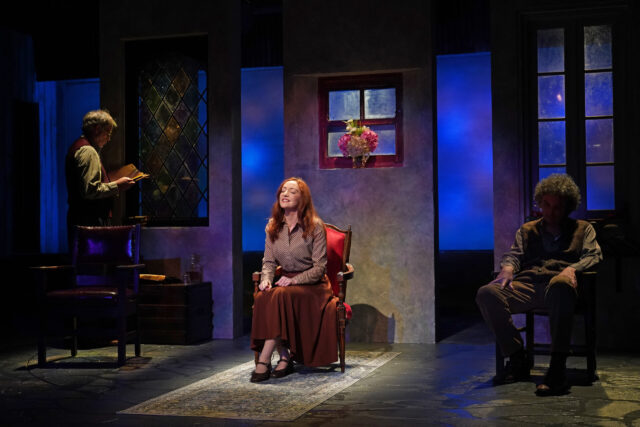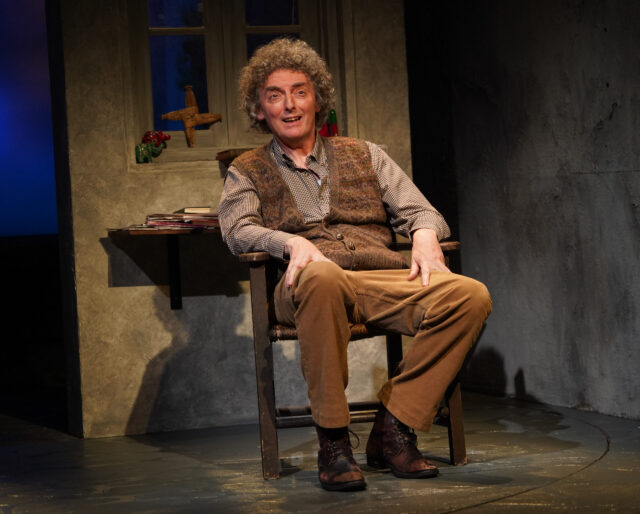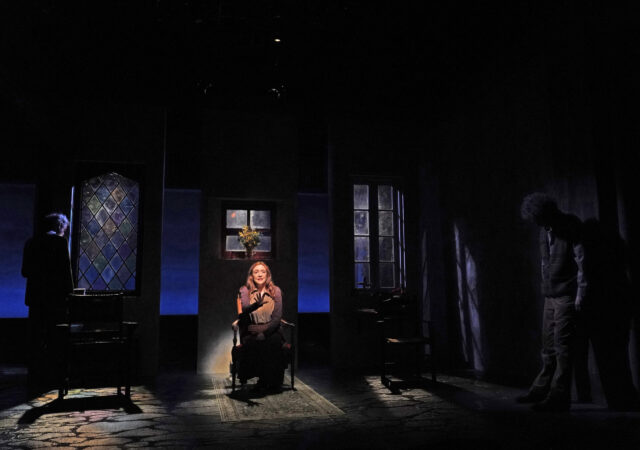
Rufus Collins, Sarah Street, and John Keating star in Irish Rep revival (photo by Carol Rosegg)
MOLLY SWEENEY
Irish Repertory Theatre, Francis J. Greenburger Mainstage
132 West Twenty-Second St. between Sixth & Seventh Aves.
Wednesday – Sunday through June 30, $60-$95
212-727-2737
irishrep.org
Early on in Irish Rep’s riveting revival of Brian Friel’s 1994 three-character play Molly Sweeney, Mr. Rice (Rufus Collins), an ophthalmologist, recounts his first meeting with Molly Sweeney (Sarah Street), who has been blind since she was ten months old, and her husband of two years, Frank Sweeney (John Keating). “I liked her. I liked her calm and her independence; the confident way she shook my hand and found a seat for herself with her white cane. And when she spoke of her disability, there was no self-pity, no hint of resignation. Yes, I liked her,” he tells the audience. “She had a full life and never felt at all deprived.”
He then describes the irrepressible Frank’s constant interruptions, insisting that there was some hope to restore her eyesight because she could detect shadows when Frank passed his hand in front of her face. Mr. Rice recalls agreeing with Frank, saying, “If there is a chance, any chance, that she might be able to see, we must take it, mustn’t we? How can we not take it? She has nothing to lose, has she? What has she to lose? — nothing! — nothing!” But they come to this conclusion without Molly’s input, two males deciding what is best for a woman.
At a party the night before her surgery, Molly realizes that she is not doing it for herself. “With sudden anger I thought: Why am I going for this operation? None of this is my choosing. Then why is this happening to me? I am being used,” she says. “Of course, I trust Frank. Of course, I trust Mr. Rice. But how can they know what they are taking away from me? How do they know what they are offering me? They don’t. They can’t. And have I anything to gain? — anything? — anything?”
In her 2019 Missouri Medicine article “Hear Me Out,” Amelia Cooper explores the controversy over cochlear implant devices; while some members of the deaf community and their families celebrate, in online videos, people being able to hear for the first time, others find them “oppressive and offensive. For these critics, deafness is not defined by the lack of ability to hear, but, rather, by a distinct cultural identity of which they are proud.” Much like deaf people who get implants and regain at least some of their ability to hear, Molly realizes that if she were to regain at least some of her sight, she may have plenty to lose, something that Mr. Rice and Frank could never understand.

John Keating again proves himself to be one of New York’s finest actors in conclusion of the Friel Project at Irish Rep (photo by Carol Rosegg)
In fact, the play was inspired by a real-life case that British neurologist Oliver Sacks documented in his May 2, 1993, New Yorker article “To See and Not See,” later included in his 1995 book An Anthropologist on Mars: Seven Paradoxical Tales. He writes, “The rest of us, born sighted, can scarcely imagine such confusion. For we, born with a full complement of senses, and correlating these, one with the other, create a sight world from the start, a world of visual objects and concepts and meanings. When we open our eyes each morning, it is upon a world we have spent a lifetime learning to see. We are not given the world: we make our world through incessant experience, categorization, memory, reconnection.”
Molly’s father had taught her how to experience a world they thought she would never see. He encouraged her to touch and smell objects, especially the plant species Nemophila, better known as Baby Blue Eyes. “I know you can’t see them but they have beautiful blue eyes, just like you. You’re my nemophila,” he told her. She remembers the smell of whiskey on his breath, which made her giddy; she does not feel the same when she smells whiskey on Mr. Rice’s breath.
In the second act, the bandages are taken off Molly, and she, her husband, and her doctor each has a different reaction to what happens next.
Molly Sweeney concludes Irish Rep’s four-part Friel Project, preceded by lovely productions of Translations, Aristocrats, and Philadelphia, Here I Come! The company previously staged Molly Sweeney in person in 2011 with Jonathan Hogan, Geraldine Hughes, and Ciaran O’Reilly and virtually in May 2020. Like those versions, this revival is intricately directed by founding artistic director Charlotte Moore (Aristocrats, The Streets of New York). (A 1996 Roundabout production starred Catherine Byrne, Alfred Molina, and Jason Robards.)

Molly (Sarah Street) dreams of a better life in Brian Friel’s Molly Sweeney (photo by Carol Rosegg)
Charlie Corcoran’s set consists of three chairs on a fake stone-paved floor, each with a slightly different rectangular wall and window behind it; Mr. Rice’s has a chest with folders and a bottle of whiskey, Molly’s has a vase of flowers on the windowsill, and Frank’s has a shelf with books and random objects. Linda Fisher’s costumes are in a muted Irish palette. Michael Gottlieb’s lighting is razor sharp; while focusing on one character, the others are bathed in shadow. In addition, abstract projections in blue, red, and purple morph on the rear horizontal wall, evoking what might be going on inside Molly’s head. Hidenori Nakajo’s sound envelops the audience in Molly’s auditory realm.
The actors are exceptional. Collins (Translations, The Quare Land) brings a cool serenity to Mr. Rice, who has not had an easy life; his wife left him for another ophthalmologist, and he eventually found himself working at a small hospital in Ballybeg in County Donegal, the fictional town where many of Friel’s plays take place. When Mr. Rice speaks, he stands up, sometimes holding a book or folder, and talks succinctly.
New York City treasure Keating (Translations, Autumn Royal) gives the unemployed Frank a harried demeanor, his tall, wiry frame flitting about as he relates his fondness for getting involved in charity cases — he’s been asked to supervise a food convoy in Ethiopia — but he has no conception of how he can help his wife.
Sitting in between them is Street (Aristocrats, Belfast Girls), who gazes into the audience, making eye contact when she or the others speak, as opposed to Collins and Keating, whose characters appear to rest their eyes or doze off, not listening to what Molly is saying; they choose, essentially, not to see or hear her and concentrate on their own future. Molly shares her story matter-of-factly, not getting wrapped up in emotion but not cold and distant either.
She could be any woman, fighting for personal freedom of any kind in a country that was still struggling with women’s rights in the late twentieth century. It’s a complex performance in a complex play that will make you think twice before offering certain types of medical advice to friends and loved ones.
[Mark Rifkin is a Brooklyn-born, Manhattan-based writer and editor; you can follow him on Substack here.]